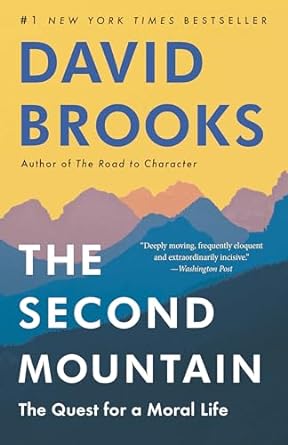
Individualism, taken too far, leads to tribalism. Hannah Arendt noticed the phenomenon decades ago (in The Origins of Totalitarianism). When she looked into the lives of people who had become political fanatics, she found two things: loneliness and spiritual emptiness…They revert to tribe. Tribalism seems like a way to restore the bonds of community. It certainly does bind people together. But it is actually the dark twin of community. Community is connection based on mutual affection. Tribalism…is connection based on mutual hatred. Community is based on common humanity; tribalism on a common foe…Tribalism is community for lonely narcissists.
from The Second Mountain
Publisher: Random House
The soul-shift from wanting more to being more
The start of a new year is a fitting time to take stock of one’s life; especially in February, now that we’ve gotten over those silly New Year’s Resolutions—Walk a mile each day? In winter? What was I thinking?
Past the declarations to lose ten pounds or write the memoir that’s been percolating within one, there remains the very human desire to do more, to be more. Perhaps to be a better spouse, or a better parent, a better friend, or member of one’s community. With January behind us, we can get serious.
David Brooks, conservative New York Times columnist and political commentator for the PBS NewsHour, offers this thoughtful book to help the process. Borrowing from various religious and wisdom traditions, Brooks uses the image of two mountains. The first mountain symbolizes the goals typically encouraged by one’s culture: professional success, respect, family and friends, personal happiness, material wellbeing. But there can come a point where people ask, “Is this all there is?” and feel that they “are under-living their lives.”
It’s a shift from “wanting more” to “being more.” This is sometimes understood as the mid-life crisis, but really, it can happen at any age (Disclosure: My first mid-life crisis happened when I was fifteen.) People may be tempted to make dramatic changes to their lives, changes that can be healthy or unhealthy.
Brooks understands this as the second mountain, the opportunity to reassess and re-orient one’s life to what’s really important to a person, wanting “to want the things that are truly worth wanting.” He distinguishes between happiness, having to do with perceived success or sensual pleasure, and joy, which involves some transcendence of self. Think of those moments “when life seemed at its peak, when life felt fullest, most meaningful, and most complete.”
In part, he blames our contemporary society, “a culture of hyper-individualism” that’s too self-preoccupied, too focused on the individual over the community, obsessed with what he calls “the Instagram Life.” You may or may not agree with his social analysis—it bears the conservative’s longing for an earlier, simpler, happier age, ignoring that all ages are complex, all have their benefits and their disadvantages. Golden ages are invariably seen in the rear-view mirror—but his basic idea is sound, and has been attested through the millennia, in different cultures, ages, and traditions: There is more to life than the ego’s goals. This is ultimately a book about renewal, about rethinking what’s important in one’s life.
Allan Hunter, one of the most beloved mentors at my seminary, told how he once was called to the bedside of a man near death. The man, bitter and angry, had been a failure as a husband and father, now estranged from his family, without friends, and remorseful at the ruin his life had become. Allan told him, “Yes, you’re dying. You have just enough time to become a saint.”
This is not a self-help manual, but rather a thoughtful guidebook, suggesting that it’s never too late to take stock of one’s life, and maybe go climb a mountain.
This review first appeared in The Columbia River Reader (February 15, 2024.) Reprinted with permission.



